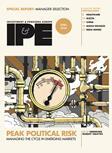The key to a successful independent fund house is to establish a firm investment philosophy, gather fund manager talent that can bring this to life and not to lose sight of what makes the firm special. As it approaches its tenth anniversary, the team at Liontrust is a good example of an independent UK fund house that has successfully applied these rules.
Liontrust is a specialist in UK equities, with a clear value bias. Its three fund managers each have their own distinctive style and a clearly articulated investment process. At the start of this year, the firm’s assets under management stood at £5bn (e7.5bn), having almost doubled in the previous nine months. This reflects a huge leap in new business on top of the almost 30% rise in the UK stock market.
Liontrust’s directors believe the true value of a company is derived from highly motivated individuals, which means they must all have an equity stake in the success of the business. The group got off to a great start with its first fund manager, Jeremy Lang, who has since become a real star in the equity income firmament. Soon after they set up in the mid 1990s, Liontrust founders Nigel Legge and William Carey, both ex-HSBC, tempted Lang to join them and put into practice his value approach, developed during a round the world sailing trip.
Lang has ever since made a virtue of being unconventional and contrarian. He looks to invest in companies that have been wrongly marked down by analysts. Lang says he looks to buy different types of stock: “First, very unpalatable stocks that other investors view as doomed. I expect little from these companies, but I do expect them to hang around, and pay me a dividend.”
Lang’s second grade stocks are not quite so poorly rated by the market, but are nonetheless unattractive: “I don’t expect any imminent improvement when I buy them, but within five years I suspect they might pass for a half decent cru bourgeois.”
Lang doesn’t want to be sucked in by the emotion of the market, but to make rational investment decisions based on investing in tomorrow’s winners, not yesterday’s.
This same belief in finding the best companies going forward and selling out losers as quickly as possible underpins the management style of William Patterson, manager of the Liontrust Large Cap Fund. He explains: “This will usually feel uncomfortable as the ‘winners’will have gone up a lot and the ‘losers’ will have gone down a lot. The principal quantitative characteristic that ‘winners’ have is positive revisions to earnings’ forecasts. ‘Losers’ have negative revisions to earnings’ forecasts and low share price momentum.”
Under the guidance of fund manager Anthony Cross, Liontrust has created a fund to tap into the intellectual capital of companies. Cross believes that intellectual capital helps to maintain profitability in a world where deregulation, the removal of trade barriers, easy access to capital, quick distribution and shortening product life cycles havecombined to increase competition.
His description of a changing competitive landscape could apply to the asset management business: “Although the move to low-cost countries helped companies remain competitive, it has created a more dangerous problem. New ‘home-grown’ competitors, through a mixture of reverse engineering, acquired know-how and fresh capital, have started producing similar products under their own brands. The western competitors are now losing business and must spend more to support dominant brands.”






No comments yet